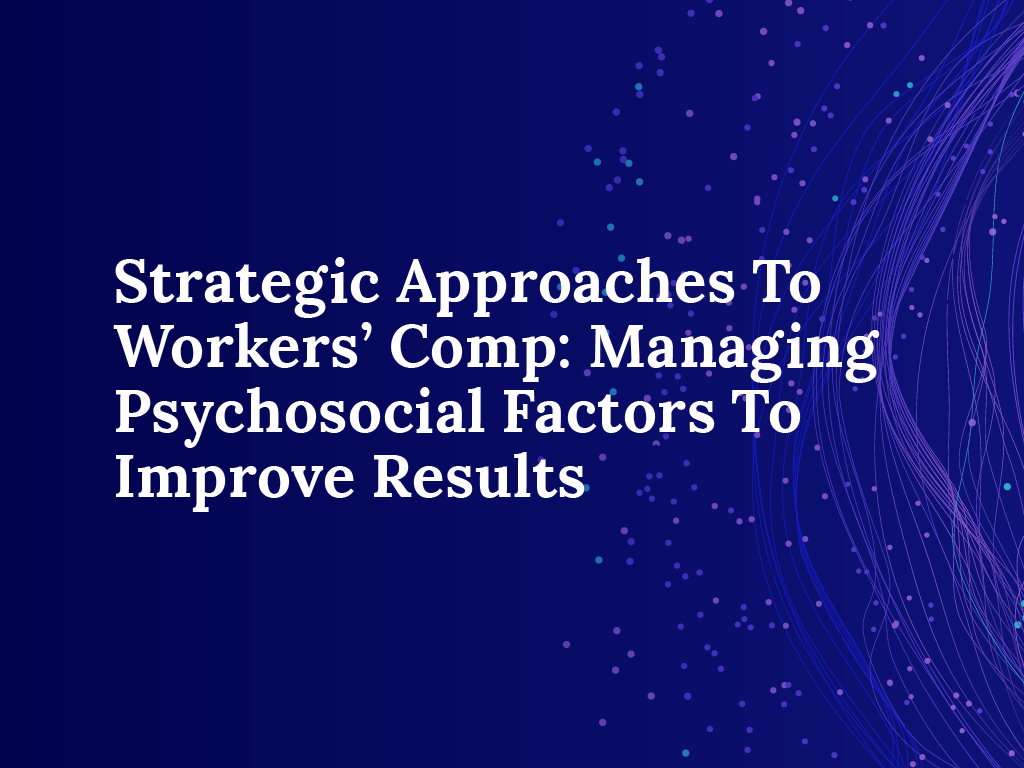A recent study summarized in both Risk and Insurance and Business Insurance caught our attention by suggesting a fresh approach for workers’ compensation (W/C) insurers to improve return to work rates.
The articles discussed new research on cervical and lumbar spine surgical cases comparing W/C and non-W/C patients. The studies revealed that W/C patients are generally younger and healthier than their non-W/C peers, but their outcomes were generally worse. From these findings, two prominent industry experts drew the conclusion that insufficient psychosocial factor management in W/C cases is the culprit and, by extension, that adequately addressing such factors can improve W/C patient outcomes.
With this study indicating that psychosocial factors are critical to delivering better outcomes for injured workers, it places a greater importance on early identification of psychosocial factors like cultural, social, environmental, and behavioral earlier, to enable more proactive efforts to address them.
What’s holding carriers back
Workers’ Comp insurers and TPAs face several obstacles in accomplishing their tasks. These include:
- Extensive claims handling and administrative responsibilities which limits the time that claim professionals have to take a holistic approach to working with injured workers.
- Psychosocial insights are “hidden†in enormous case files, forcing claim professionals to read and analyze hundreds of pages of medical records. And, even with careful review, the sheer volume of case file information can result in important details being missed or forgotten.
- Claims models that project outcomes typically use only a few diagnoses, often just a primary and secondary. Analytics tools built off such a limited data set can overlook psychosocial factors on complex cases with multiple injuries or conditions.
- Extensive caseloads make directing behavioral specialists challenging. The extensive documentation in complex cases makes it difficult to direct behavioral specialists to the appropriate cases. Typically, specialists rely on claims professionals to correctly identify cases with psychosocial issues and refer them early in the case lifecycle for better outcomes.
In other words, despite the recent waves of digital transformations throughout the insurance industry, Workers’ Comp claims organizations have yet to fully realize the modernization promise.
A better way: AI-powered Claims Guidance
Artificial Intelligence presents a solution to these challenges. A Claims Guidance platform powered by AI can intelligently sift through medical records and identify injured workers with addressable psychosocial factors and suggest next best actions. Essentially, Claims Guidance puts AI to work alongside claims professionals, like a panel of advisors with deep expertise in healthcare and Workers’ Comp, which can:
- Read and analyze unstructured information like medical records and examiner notes to identify additional comorbidities, especially cultural, social, environmental, and behavioral factors that are unlikely to be the primary or secondary reason for the initial claim.
- Leverage historical claims files and third party medical recovery information to project case durations and suggest actions such as engaging behavioral therapists, to help injured people back to work based on similar medical conditions, treatments, and context.
- Keep the human in the loop, by recommending next best actions and highlighting source documentation to provide rationale for those recommendations. Claims Guidance allows claims professionals to accept/reject the recommendation, empowering them to make better decisions more quickly
- Monitor each patient’s case continuously to suggest new/additional actions as their case evolves, reacting in near real time to medical updates as files are updated.Â
How claims guidance benefits insurers and injured workers
Leading insurers are now introducing AI to their claims organization, enabling their expert resources to focus on the right claims at the right time, and take the best actions to help injured workers recover more quickly and fully. This is driving multiple benefits:
- Addressing psychosocial factors earlier in the case lifecycle, in order to accelerate a person’s return to work. Earlier identification enables the engagement of behavioral counseling and other support to injured workers earlier, driving better outcomes for all parties.
- Improving prioritization at scale. With AI analyzing medical data, predicting claim trajectories, and monitoring claims continuously, claims professionals can focus their time and expertise on the highest priority clinical and vocational interventions. Arming adjusters with this kind of continuous insight, will empower them to help more injured workers return to work sooner.  Â
- Improving resource allocation, reducing unnecessary claims indemnity and expense. Claims guidance gives managers and executives a better understanding of their caseloads and workflows. This includes setting policies and parameters for matching individual claims with the appropriate examiner, triggering the involvement of medical/nurse case management, fraud, litigation, and other specialists, and auto-adjudicating payments where human expertise is unnecessary. Rapidly applying appropriate resources also reduces frontline team burn-out and decreases talent attrition.
- Enhancing injured worker experiences. Guiding claims professionals and other specialists on next best steps significantly reduces “friction†for injured workers, such as avoiding unnecessary follow-ups or case managers making unintentionally insensitive inquiries due to incomplete case knowledge. The elimination of such barriers promotes trust among workers, which encourages them to work with insurers for optimal outcomes.
Adding it all up
This study demonstrates that psychosocial factors are one of the biggest drivers of inferior medical outcomes in Workers Compensation patients. With this understanding Workers’ Comp carriers and TPAs can now pivot to facing these challenges head on. The maturation of AI provides a solution to systematically identify and address these factors throughout the entire claim lifecycle.
Using these technologies will help improve outcomes, reduce costs, and maximize resources creating a win-win-win situation for injured workers, employers, and carriers.

